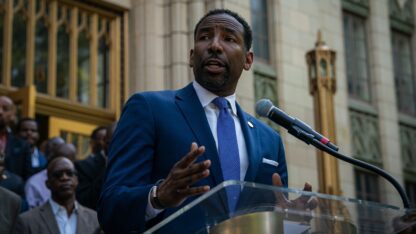Deal Signs Final Wave Of Criminal Justice Reforms Into Law
Gov. Nathan Deal Sunday signed into a law a bill to help ex-offenders re-enter society after prison, the third and final leg of sweeping criminal justice reforms that have defined his first term.
Backed by the Lee Arrendale State Prison Women’s Choir, Deal signed the bill during services at Antioch Baptist Church in his hometown of Gainesville.
Deal said nearly all of Georgia’s almost 60,000 inmates will eventually be released from prison. With around one-in-three parolees returning within three years of release, Deal said the newest wave of reforms is aimed at helping ex-offenders stay out of prison once they leave.As heard on the radio
“If we do not do what we can to make it possible for them to re-enter and be law-abiding citizens when they re-enter, then we have in fact increased the danger to all of us as Georgians,” Deal said.
In 2012, the General Assembly passed the first phase of the governor’s reforms, which focused on moving nonviolent offenders into treatment facilities. That legislation was followed last year with changes to the juvenile justice system.
The newest reforms, now law, bar some state agencies from disqualifying job applicants because they have a criminal record. Additionally, it gives judges more leeway in whether to confiscate drivers licenses for low-level drug offenders.
The law also requires the Board of Corrections to create a Program and Treatment Completion Certificate, a sort of recognition for inmates who complete any required treatment or vocational training while in prison.
“They can take that with them when they go to apply for a job, and there will be the possibility even that we can go further to incentivize employers to give them a job,” Deal said.
Critics say the new law doesn’t go far enough because it doesn’t include those incentives for companies that hire ex-offenders.
Speaking after the ceremony, Deal said he believes the private sector will follow the state’s lead in hiring ex-offenders, but added those incentives are something the state may look at in the future.
“Once they get out, we believe that the private community is going to respond favorably. We are already seeing those kinds of positive responses,” Deal said.
Judy Mize, who attended services Sunday, said she has a son who’s recently been released from prison.
“He can’t find a job anywhere, just like the governor said. When you get to a certain block, and you have to check that box, and it says ‘felony,’ they won’t hire you,” Maize said.
Mize said she hopes Deal’s reforms will make her son’s job search a little bit easier.
9(MDAxODM0MDY4MDEyMTY4NDA3MzI3YjkzMw004))








